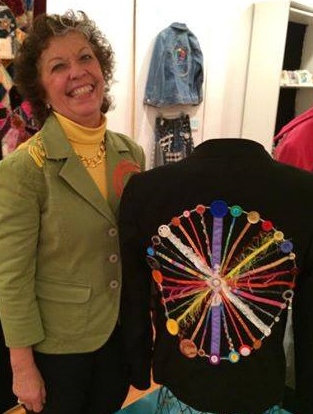Here’s a post to share with your HSP or Gifted Kids and Teens:
A high school senior recently told me, “I think I must have some mental disorder. I’ve been searching online since I was in middle school to find out what it is.” As we talked, it became clear that intense emotions were the source of this big concern.
online since I was in middle school to find out what it is.” As we talked, it became clear that intense emotions were the source of this big concern.
“I wish I had heard this when I was in middle school” a high school senior told me a few weeks ago, at the end of a talk I gave to highly sensitive and gifted students and their parents. “It would have saved me so much anguish.” So here, I’m going to share with you some of what I told them:
I remember the day when I sat on my doctor’s examining table and told him that I thought that I had a higher level of anxiety than most people do. His response was to ask me if I thought that I had an anxiety disorder. My immediate response was “No”. And that’s my response to you, too. Having intense emotions doesn’t automatically mean that you have a mental disorder.
Just because you have intense emotions does not automatically mean that you have a mental disorder.
But that’s what we often think. How else do we explain to ourselves the frequent intensity of our emotions? How else do we explain the trouble in our social relationships to most other people?
Having intense emotions often or having trouble connecting with other people does not mean that you have a disorder. It does not mean that you’re a freak of nature!
It might mean that you’re a CASIGY! ™. A CASIGY™ is a person who is ─
- Creative, Complex, Curious
- Acutely Aware
- Super-Sensitive
- Intense, Intelligent, likely Introverted, and/or
- Gifted
- You!
Highly sensitive or gifted students and adults often identify with several or even all of these traits. How about you?
Let me say this again! Being a CASIGY does not mean that something’s wrong with you. It means that you’re a normal CASIGY!
Many CASIGYs discover that they are different from most other people at a very young age. (How old  were you when you noticed this?) Maybe a grown-up commented on your differences. Maybe other kids wouldn’t play with you. Maybe you could do things they couldn’t. So you ended up all alone. Maybe your feelings were hurt. Maybe you were lonely. Maybe you wondered, “What’s wrong with me? “.
were you when you noticed this?) Maybe a grown-up commented on your differences. Maybe other kids wouldn’t play with you. Maybe you could do things they couldn’t. So you ended up all alone. Maybe your feelings were hurt. Maybe you were lonely. Maybe you wondered, “What’s wrong with me? “.
The answer is, “Nothing is wrong with you!”
 You’re like a normal race horse, not a defective draft horse! A draft horse is a work horse that likes to walk slowly and pull things around. They are used to pull wagons or plows. They walk back and forth, covering the same ground over and over. And they like it. They’re happy and content plodding along doing the same thing all the time.
You’re like a normal race horse, not a defective draft horse! A draft horse is a work horse that likes to walk slowly and pull things around. They are used to pull wagons or plows. They walk back and forth, covering the same ground over and over. And they like it. They’re happy and content plodding along doing the same thing all the time.
A race horse wants to run – and run fast. I said that wrong. A race horse NEEDS to run  fast. A race horse is an INTENSE hose. (Can you see the intensity on this race horse’s face and body?) A race horse is also going to see a mouse beside the road that a draft horse doesn’t see. AND it may get spooked by it! Imagine, a big, fast race horse getting spooked by a tiny mouse. Can the mouse hurt the horse? No. But that doesn’t stop the race horse from getting spooked by the mouse. The things that startle or spook CASIGYs may not be any more logical than a mouse spooking a race horse.
fast. A race horse is an INTENSE hose. (Can you see the intensity on this race horse’s face and body?) A race horse is also going to see a mouse beside the road that a draft horse doesn’t see. AND it may get spooked by it! Imagine, a big, fast race horse getting spooked by a tiny mouse. Can the mouse hurt the horse? No. But that doesn’t stop the race horse from getting spooked by the mouse. The things that startle or spook CASIGYs may not be any more logical than a mouse spooking a race horse.
Many CASIGYs identify with having a mind like a race horse.
- It needs to run fast.
- It notices things others miss.
- It reacts strongly to what it sees.
And all of this is because of the kind of creature it is, not because there’s anything wrong with who it is or the way it is.
So how do you survive and thrive when you’re like a race horse?
You stop trying to live like a draft horse. You learn how to live like a race horse. How do you do that? When you start feeling like there’s something wrong with you, remind yourself that it’s OK to be who you are, a race horse. You’re not a defective draft horse, you’re a race horse. You’re not defective, you’re Different By Design!
 Here’s what to do when your emotions get intense: The first thing to do is to breathe, just breathe. Put your hands on your belly below your waist and breathe, slowly and deeply, so your hands move. Slow down your breathing. Try it now. What happens inside you? Do you relax? Do you feel better? Many kids and teens tell me that they feel better right away when they do this Belly Breathing.
Here’s what to do when your emotions get intense: The first thing to do is to breathe, just breathe. Put your hands on your belly below your waist and breathe, slowly and deeply, so your hands move. Slow down your breathing. Try it now. What happens inside you? Do you relax? Do you feel better? Many kids and teens tell me that they feel better right away when they do this Belly Breathing.
It can help to understand that emotions are like ocean waves. 
Waves are energy moving through the ocean. Emotions are energy moving through you. You have intense emotions when your energy is intense.
Have you been in the ocean? What happens when you fight an ocean wave? It wins and you lose. The same thing happens when we fight a wave of emotion – it wins and we lose. So don’t fight your emotions or stuff them away; instead, help them to move through you and out of you.
 You can do that with what I call Catch-&-Release.
You can do that with what I call Catch-&-Release.
You ‘catch’ the emotion, you feel it and you release it.Here’s how:
- Hold a non-breakable object in your hand (as simple as a pen or a pencil).
- Identify what you’re feeling right now
- Breathe in, feel the emotion(s) and name it. If you need help identifying it, you can use this to help you: “How Are You Feeling Today?
- Breathe out, drop the thing you’re holding and release the emotion.
You can do this almost anywhere and anytime. You can do this at your desk in school. You can do this on the sports field or the playground. You can do this at home. It’s good to practice it often so when you really need it, you can easily remember it and use it. You can do this if you’re 6 years old. You can still do this when you’re 16 or 26 or even when you’re ancient, like if you’re 66 years old.
Please let me know in the comments below what questions you have, and of course, what you like about this. Especially let me know what you’d like me to talk about in a future blog post for CASIGY kids and teens.

